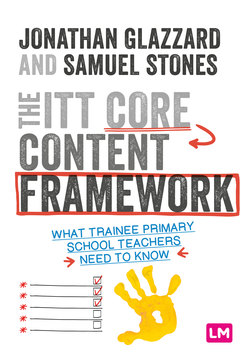Читать книгу The ITT Core Content Framework - Samuel Stones - Страница 7
На сайте Литреса книга снята с продажи.
About this book
ОглавлениеThis book addresses the Initial Teacher Training Core Content Framework. This framework outlines the essential knowledge and skills that trainee teachers need to develop during their initial teacher education course. The framework is aligned to the Teachers’ Standards, but includes further detail about precisely what trainees need to know, understand and be able to do. This book is intended to be used by primary trainee teachers on primary 5–11 teacher training courses.
The book is structured in line with the framework and the Teachers’ Standards. However, rather than interpreting the standards as distinct from each other, it is important that you understand their interrelatedness. Effective behaviour management (TS7) supports pupils to make good progress (TS2). Good progress (TS2) is also supported by demonstrating high expectations of learners (TS1), good subject knowledge (TS3), carefully structured lessons and pedagogical approaches (TS4), inclusive teaching (TS5), effective use of assessment (TS6) and effective deployment of teaching assistants (TS8). All the standards therefore support pupil progress.
As you move through your initial teacher training, you will gradually develop new knowledge and skills. Your knowledge and skills will be supported by tutors, school-based mentors, other teachers in school and the wider education community and personal research. It is important that you take responsibility for your own professional development. Teaching is a challenging yet deeply rewarding profession. You should be prepared to be reflective and take risks in your practice. At the same time, it is important not to be afraid to seek advice and ask for help when you need it.
At this stage in your development (and at all stages of your career), it is important to view yourself as both a teacher and a learner. Working in different schools, with different classes of children of varying ages will inevitably test you. There are rarely any right or wrong ‘answers’ in teaching, but certainly many shades of grey. What works with one pupil or one class may not work for another. Be willing to try different strategies, implement and evaluate them. You will experience a great deal of success, but you will also experience lessons, days and sometimes weeks when things seem to be going drastically wrong. Do not despair. In teaching, no two days (or two pupils) are the same. This is what makes teaching so exhilarating. However, when things go wrong, it is all too easy to take things personally and to blame yourself. In these situations, try to learn from what you have experienced. Try not to dwell on things and use all your experiences (good and bad) to shape your development as a teacher. Effective teachers continually view themselves as learners. They consistently reflect on their practice and solve problems as they occur. When things get bad, talk to others – your peers, tutors and other teachers. We all experience days where the last place we want to be is in a school. On days like this, remember why you decided to become a teacher. It provides you with a direct opportunity to influence children’s futures, to change values, attitudes and beliefs, and to make a real difference.
The book provides you with some key knowledge that you will find useful. However, one book cannot cover everything you need to do. This book attempts to introduce you to the key knowledge that you need, but you will want to research some aspects in greater depth. Each chapter includes links to research and practical classroom examples that will help you to contextualise the theories and literature. Your understanding of the core content needs to be underpinned with rich and sustained periods of time in school, which will enable you to apply your knowledge of the framework within your practice.
